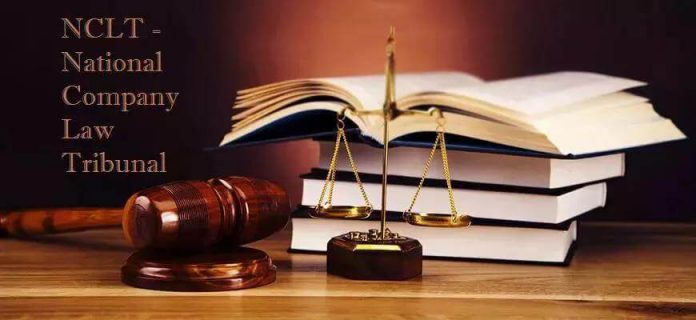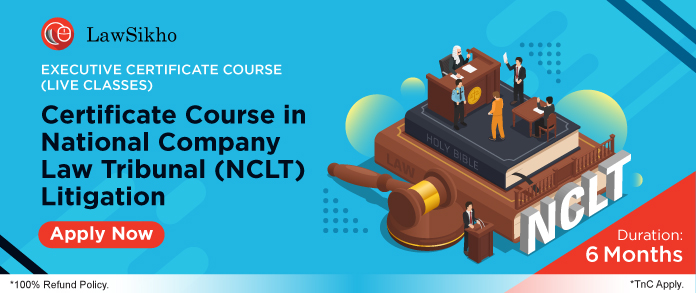This article is written by Shankarlal Raheja, pursuing a Certificate Course in National Company Law Tribunal (NCLT) Litigation from LawSikho.
Table of Contents
Introduction
The National Company Law Tribunal (NCLT) bench was established by the government in June, 2016 under the Company’s Act of 2013. It is a quasi-judicial body and hears matters related to Indian corporations. It was set-up under Article 245 of the Indian Constitution, therefore extends to the whole country. It replaced the previous Company Law Board (CLB) and has complete authority over company matters including the pending cases.
Earlier laws had minimal interference with company matters since they are private organizations. In the 1900s the East India Company followed the rules of the Companies Act, 1913 to run their firms and companies. After liberalisation in 1991, the list of financial corporations foreign and homegrown drastically increased. India was moving from socialism to capitalism. The old laws in spite of various consistent amendments were incapable of managing the booming industry. Indian laws were rampant with over-regulation and red taping which deterred companies from investing. There was also a lot of ambiguity and lack of structure for processes like bankruptcy. With the fall of profitable companies like Cafe Coffee Day, ILFS and Jet Airways, one can deduce that the new laws brought in a much-needed makeover.
Powers and functions of the NCLT
The Eradi Committee decided the functions and purpose of the NCLT. It is equivalent to a court of law and adjudicates all legal cases concerning the body Corporates formed under the Companies Act 2013 or any other previous Companies Act (“Act” for short). The Law declared the NCLT body as an independent judicial authority and the powers of other bodies such as the High Court, the Appellate Authority for Industrial and Financial Reconstruction (AAIFR) and Board of Industrial and Financial Reconstruction (BIFR) were all transferred to the former. Therefore, the tribunal examines matters of all companies listed in India except financial institutions like banks. They have a principal bench in New Delhi and 15 Subsidiary benches all over India in places like Mumbai, Prayagraj (Allahabad) and Chennai.
- Heads of the bench- These benches are presided by a team including the President, 16 Judicial members and 9 Technical members. The president should be a judge of a Hon’ble High Court for at least 5 years. The judicial members could be either judges of High Court and district court or an advocate with 10 years of practice. Technical members have usually experienced persons like Chartered Accountants, Cost Accountants etc with exceptional knowledge about the financial industry. The Bench proceeds as per the rules of the Code of Civil Procedure and is guided by the principles of natural justice unless there are other provisions mentioned in the Act or any rules of the land applicable to the circumstance. It is also the adjudicating authority in insolvency proceedings of companies and LLPs as per the Insolvency and Bankruptcy Code, 2016.
- The quasi-judicial nature- The tribunal is of quasi-judicial nature i.e. it has the authority to conduct hearings over disputes and give judgements like the court of law but will not have the same constitutional validity as a court. In March, 2019 the Supreme Court bench heard a petition questioning the constitutional validity of the NCLT stating that it infringes the basic structure of the constitution and undermines judicial authority as it exercises powers that normally reside with High Courts can be easily eliminated by the Centre therefore judicial authority is being compromised. The court upheld the validity of the tribunal stating that judgements of the NCLT can be challenged at the NCLAT and the Supreme Court.
Areas of the company law where NCLT plays an important role
The Areas of the Companies Act where NCLT plays a vital role and powers relating provision of company law are Compromise arrangement and Amalgamation, winding up, Oppression and mismanagement, Revival & Rehabilitation of sick companies, Compounding of offence etc and are detailed as below:
-
Compromise arrangement and amalgamation
Section 230-232 of the Act deals with Compromise, Arrangement and Amalgamation (commonly known as Mergers). This Section provides for Arrangement, which includes re-organisation of the Company’s share Capital by consolidation and or division of the shares of different classes of shares of the Company.
-
Oppression and mismanagement
Section 241-246 of the Act deals with the provisions to effectively deal with oppression and mismanagement in a company. In Foss v. Harbottle the principle of majority originated which established the rule of majority and provided that the individual shareholders have no cause of action against any wrongdoing by the corporation. The majority rule is the common norm, which overshadows minority rights. The objective of the Act is to strike a balance between the interest of stakeholders and the effective control of the company. Therefore, the Indian company law, 2013 has put in place section 241 to 246 to safeguard minority rights.
The Act has made considerable progress as it has lowered the threshold to complain of oppression and set the bar higher for being accountable for mismanagement. Section 397 allows you to approach the tribunal for cases of abuse of all forms in the present as well as the past and seek justice. Thus If any stakeholder is of the opinion that the affairs of the company are being conducted in any manner which is prejudicial to the interest of the company, then an application shall be filed with the NCLT.
-
Class action suits
A class action permits one or more persons to file and prosecute as plaintiff on behalf of a larger group, or “class”. These suits are a representative suit where the interests of a class are represented by a handful of them. A large group of people against a defendant, responsible for causing common harm to the entire group, can file class action suits. Thus in a class-action suit is a type of lawsuit wherein groups of people with similar grievances are represented by one of the members. It is a useful tactic to pool resources for a common goal.
Section 245 in the Companies Act 2013 provides remedy to the investors against wrongful actions committed by the various stakeholders’ including the company, its management or other consultants and advisors. Under the Act the offender shall be liable for punishment and or to compensate the stakeholders for the losses caused to them qua the fraudulent practices. Apropos the fraud in the company where companies try to dupe investors, Class action suits are filed under Section 245 of the Act. Class action can be filed against both types of companies whether registered under the Act namely public or private with one exemption i.e. banking companies.
-
Winding up
The company’s liquidation is undertaken when the company is in loss and has to pay off all the debts to the creditors. The winding-up of a company is a process in which assets of the company has to be sold in order to make the remaining payment. The winding up of a company by the tribunal which falls under section 357 of the Act. Section 270 of the Act, provides for winding-up of a company either by the tribunal or voluntarily. In the first instance the company approaches NCLT for an order for winding of a company, and in the second instance, the shareholders or the creditors themselves allow the company’s liquidation due to losses or on account of inability to pay debts.
-
Deregistration
The tribunal now has the power to dissolve companies and deregister companies that have enrolled themselves through fraudulent means. The errors can be investigated and questioned and parties can be held liable. Section 7(7) precisely states the conditions when the registration will be considered as unlawful or unjust.
-
Disputes relating to the transfer of shares
Section 58 and 59 gives the NCLT authority to hear cases if a company has refused to transfer shares. In the previous act, this penalty was available only for shares and debentures but now it is applicable to all securities. The suffering party can appeal within two months to seek compensation.
-
Revising financial statements
Falsifying record books is a common malpractice in India. Section 447 and 448 of the act forbid companies from opening and revising financial accounts on their own. Only the tribunal can under special circumstances order a company to reopen their accounts. Section 131 allows them to review their accounts but not reopen them.
-
Deposits
In a notification in 2014, the power to deal with deposits was transferred to the NCLT, the laws regarding this are also comparatively clearer. Depositors also have an additional procedure of filing class-action suits for their grievances.
-
Powers to investigate
The NCLT can inquire about the workings of a company if more than 100 people file an application against one company. They can freeze company assets, place restrictions and temporarily halt distribution of products. They can ask a non-member of the tribunal to investigate in India or anywhere else in the world.
-
Compounding of offence
The Power of compounding offences under the Act shall now vest with NCLT, and all compounding matters, which are above the prescribed monetary limit will be approved by NCLT.
-
Uniform financial year
Under section 2 (41) of the Act has notified 1 April 2014 as the date for commencement of the financial year and therefore the Act requires that every company to have a uniform financial year ending on 31 March. Alternatively, it will have to apply to the NCLT to have a different financial year.
Conclusion
The NCLT focuses only on corporate matters which results in a speedy investigation. The presiding judges are a combination of technical and judicial experts, which will help in more sound and effective judgements. It will also remove the multiplicity of litigation before different forums and courts thus time will reduce. In cases of bankruptcy, the insolvency and revival of the body corporate are handled by NCLT hence it will assist in a short and precise process. Exclusive jurisdiction will remove instances of ambiguity. The grievance redressal mechanism has also drastically improved. Corporations in today’s age have become very important in determining the financial health of a country in such cases laws should help and benefit them rather than being a burden.
Students of Lawsikho courses regularly produce writing assignments and work on practical exercises as a part of their coursework and develop themselves in real-life practical skill.
LawSikho has created a telegram group for exchanging legal knowledge, referrals and various opportunities. You can click on this link and join:
 Serato DJ Crack 2025Serato DJ PRO Crack
Serato DJ Crack 2025Serato DJ PRO Crack











 Allow notifications
Allow notifications


